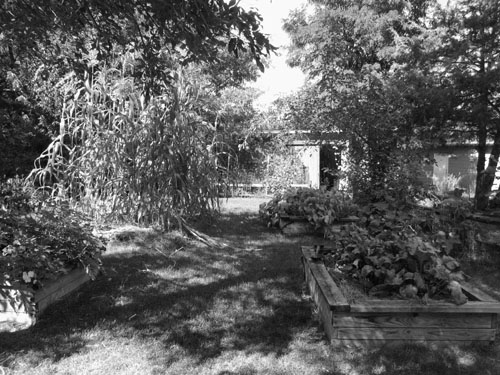68 bar falls 30.06 0mph NNE dew-point 38 sunrise 6:45 set 7:34 Lughnasa
First Quarter of the Harvest Moon rise 4:49 set 12:17
Corn, Bleeding Heart, Impatiens, Beets and Beans at 3pm
This morning I got up, ate breakfast and went straight outside. Posting in the morning has begun to interfere with other projects. Even so, I like to do it. The posting gives a start to the day. Just too long a start sometimes.
Till noon I cleaned up old wire fencing so we can recycle it on Saturday. At noon I began the sun/shade survey for our ecological gardens project. Instead of shading in a map I decided to use the digital camera and print contact sheets of prints shot at 9AM, noon, 3pm, 6pm. I stand in the same location for each shot. It takes about 20 images to cover the whole yard.
After the nap I went out into the wide world to collect meds and some ink for my Canon color printer. This is the first time I have purchased ink for this printer, in fact it’s the first time I’ve purchased ink for any printer other than my HP L4 since 1991. The cost of color ink impressed me. High. Ouch.
About a year ago right now Kate and I attended a conference in Iowa City, Iowa. Focused on climate change and the issues involved, I came away convinced I needed to get involved in some direct way. I made a list of things to do at the conference, but as the year has gone by I realize I have gotten a much better handle on personal action.
The Sierra Club political committee was one concrete step. This gave my leverage in the political arena, working with committed folks who have a proven track record. The whole permaculture adventure also came from that time. This allows Kate and me to put our homeplace into the mix as a sort of experiment in sustainable living. We have determined that our next car purchase, when Kate retires, will be an eco-sound model. Kate put in compact fluorescents in most of our light sockets. The shift this year to a larger amount of vegetables grown at home began the process for us here, as has the hydroponics. A couple of years ago, the last Woolly meeting I had here, we focused on Thomas Berry’s book, The Great Work. Ever since I read it the Great Work has crept into the forefront of my vision, altering my future and what I want to do with the last years of my life.
The following two posts come from the Iowa Conference of PSR, Physicians for Social Responsibility:
September 18, 2007 10:45AM 68 97% 51% 68dewdoint bar, rises 0mph windrose N Ordinary Time First Quarter of the Harvest Moon
I have a good deal to report from the weekend’s conference on the health consequences of global warming. I will summarize here, later today, with a more full report and strategy to follow in the Great Work section. Suffice it to say I found the conference exhilarating. You can count me among the convinced by the data crowd.
Here’s the most important take-away I have right now: climate change needs a reframe. It must move from the second rank of political issues to the first rank. In order to do this we have to start emphasizing the national security challenges and opportunities represented by a response to climate change. The obvious challenge to our national security lies in our dependence on fossil fuels, especially oil. This challenge strains our economy in many ways: military projection (Carter doctrine), an economic infrastructure dependent on petroleum and the political and economics costs of mitigation and adaptation to the climate change created by excess use of fossil fuels.
September 18, 2007 11:09PM 66 97% 51% 65dewdoint bar, steady 0mph windrose SSE Ordinary Time First Quarter of the Harvest Moon
Here’s a quick summary of what I learned in Iowa.
1. Climate change is both a national security issue and an issue as important as national security.
2. Climate change has a cascade of health effects, some minor, many major.
3. There are various constituencies among the climate change leadership and they do not agree with each other.
4. The UN through UNEP and GEF and the IPCC process has standing as a conservative bench mark for climate change science.
5. The concept of the commons, the stuff not owned by any one, but shared in common, is very important to this generation of climate change debate. The air, soil, ocean, and mineral wealth of the plant is, or should be, in the commons. The most wealthy corporations have figured out how to make money from the commons, e.g. Exxon, Big Coal, Big Steel, Big Agriculture.
6. There are many creative solutions in the hopper, i.e. The Sky Trust, the Climate Legacy Project, mitigation and adaptation planning at several levels: medical, governmental, emergency, state, national, international to name a few.
7. The hope for rapid change may depend on the politics of the next 18 months, then the first 100 days of a new administration.
8. A constituency for climate change may be about to jell.

